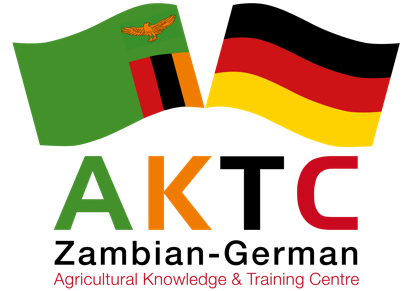
The Zambian-German Agricultural Knowledge and Training Centre (AKTC), which is currently running in its 3rd phase (08/2021 – 07/2025) on the behalf of BMEL, has recently held its 9th Steering Committee Meeting in Lusaka. During the Meeting, the German Ambassador of Zambia, Dr. Anne Wagner-Mitchell, highlighted the impressive results from nine years of project implementation: The AKTC is now a training institute registered by TEVETA in Zambia and has established the first and only Tractor Driving School in the country. The AKTC Team has provided practical crop production and machinery training for close to 18,000 people from all over Zambia and has introduced a number of innovations, such as the automated weather station, a PV system, a phytobac systems to biodegrade chemical residues and a satellite monitored site specific irrigation planning system, which helps to save water. The AKTC has also established a strong research relation on climate-adapted farming methods in cooperation with the German University of Hohenheim and the University of Zambia.
In its current phase, the AKTC is developing into a regional competence centre of for climate-resilient crop production. The presence of more than 300 visitors, including a delegation of SACAU members (Southern African Confederation of Agricultural Unions) from 12 countries during the CAFM (Climate Adapted Farming Methods) Field Day in March shows the recognition of the AKTC as a competence centre.
During the Steering Committee Meeting, it was agreed between the German Ministry of Food and Agriculture (BMEL) and the Zambian Ministry of Agriculture (MoA) that the AKTC should continue its beneficial activities and that both Ministries will continue their cooperation beyond the originally planned time frame from 2025 onwards with an extension of the project for another 3-4 years. The CAFM research results have given emergent farmers, agricultural companies, and institutions in Zambia insights on the importance of mechanized conservation agriculture by providing first-hand research findings through trainings and organized field days. Therefore, having conducted the trials for three successive farming seasons, the compiled results prove that CAFM is both sustainable and economical.
However, with this new time frame, the AKTC wants to go one step further from Mechanised Conservation Agriculture (MCA) to Regenerative Agriculture (RA). In order to teach and demonstrate RA practices, the AKTC is now in the planning stage to build a small demonstration farm. For this new RAINES sub-project (Regenerative Agriculture to improve Nutrition and Environmental Sustainability), our partner GART (Golden Valley Agricultural Research Trust) has provided additional land for the project.
It is envisaged to copy the size of many small emergent farms in Zambia, with an area of approx. 8 ha. The objective is to establish a regenerative small farm, which serves as a research and demonstration farm by 2025.
It will also become a demonstration farm, where the AKTC trainees can learn practically about:
Crop management of staple and cash crops (e.g. vegetables and fruits)
Avoiding post-harvest losses
Intercropping
Chicken keeping
Goat keeping
Agro-ecology
Circular economy through the integration of animal production
As already practised in the main project, the AKTC will motivate women farmers to participate in the training in order to keep - or even increase - the percentage of women trainees (36% at the moment). It is further envisaged to cooperate with scientific research institutions in order to accompany the trials and demonstration, exchange experience on a technical level and get proper data analysis from the new techniques applied.
According to the outcome of the research, the knowledge can be disseminated by AKTC during trainings, presentations, and conferences in the Southern African region. With this new sub-project, AKTC is in line with the policies of our German Ministry of Food and Agriculture (BMEL) and contributes to the fulfilment of goals of the National Agricultural Policy of Zambia.
For more information contact Projectmanager Tesa Weiss (tesa.weiss [at] afci.de) or see webpage (www.aktczambia.com)
